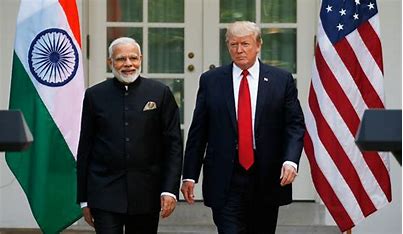The recent setbacks could soon be seen as bygones, particularly if Trump brings a team of Indian Americans and India-friendly officials back to Washington, as many anticipate.
PANAJI, GOA: As the political landscape in the United States continues to evolve, one thing remains clear: the future of Indo-US relations looks particularly promising should Donald Trump return to the White House. This optimism is rooted in a shared desire for pragmatic foreign policy and a recalibration of ties, particularly in light
India, which has long been one of the US’s most strategic partners in the Indo-Pacific, sees a potential Trump presidency as an opportunity to repair the damage caused by Biden’s policies. The relationship between the two countries took a significant hit over several controversial issues, most notably the alleged assassination attempt scandal of Summer 2023. Tensions deepened with American interference in India’s recent general elections, creating a sense of distrust. Furthermore, India was taken aback by the US-backed regime change in Bangladesh, an event that many Indians viewed as a betrayal of their regional security interests. Compounding these issues was the pressure on India to abandon its ties with Russia, a longstanding partner in defence and trade.
However, these setbacks could soon be seen as bygones, particularly if Trump brings a team of Indian Americans and India-friendly officials back to Washington, as many anticipate. One of the most pivotal figures in this potential reshuffling is Kashyap Patel, a key Trump ally, who is rumoured to be under consideration for CIA Director. Patel’s confirmation would be seen as a positive move for India, especially considering his deep understanding of South Asian geopolitics and the need for a strong Indo-US relationship.
The first order of business, should these stars align, would likely be to ensure that the US takes a more assertive stance against anti-India elements operating within its borders. Many in India have expressed frustration over the US’s lack of action against Khalistani leaders such as Gurpatwant Singh Pannun, who have openly threatened violence against India’s diplomats and citizens. These leaders are seen by many in India as pawns in a larger hybrid war being waged against the country. Trump’s law-and-order platform is expected to resonate with India, which hopes that he will crack down on such provocations and take a firm stand against figures who openly promote violence and terrorism.
Another key issue for India is the US’s interference in its internal affairs. Criticism from American officials, as well as the activities of various NGOs seeking to foster anti-state sentiment, particularly in India’s northeastern states, has been a significant point of contention. The Biden administration’s approach to India’s domestic matters has been viewed as unsympathetic at best, and outright hostile at worst. For India, these actions cannot continue if relations are to return to normal. However, Trump’s team may face resistance from liberal-globalist elements within his own government, often referred to as the “deep state,” making this a difficult but necessary challenge to address.
Regionally, India would also appreciate a shift in the US’s approach toward Bangladesh. Since the US-backed regime change there, Bangladesh’s Hindu minority has suffered considerable persecution, including pogroms and violence. India has expressed concerns that the new government, which came to power in the wake of the regime change, is failing to protect religious minorities. The US should use its influence to push for truly free and fair elections in Bangladesh, as well as to ensure the safety and rights of the Hindu community.
Further, India seeks a more consistent and focused approach from the US in terms of its broader regional strategy. Under the Biden administration, US policy has been more balanced between India and Pakistan, something that has not been to India’s advantage. India wants the US to reaffirm its commitment to treating it as a key partner, rather than continuing to balance relations with Islamabad, which has long been a source of tension between the two nations. The Trump administration, which placed greater emphasis on India, is seen as more aligned with India’s strategic interests, especially given its Indo-centric regional policy and its hawkish stance on China.
Additionally, India remains wary of US efforts to undermine its relationship with Russia. Despite significant pressure from Washington to sever ties with Moscow, India continues to value its defence and trade partnership with Russia. Trump’s recent pledge to “un-unite” Russia and China could be the basis for India to argue that maintaining strong ties with Russia helps prevent the latter’s over-reliance on China. This would align with Trump’s broader Great Power balancing strategy, and India hopes that such an approach would resonate within his administration.
Finally, India’s relationship with China remains a crucial point of contention. While India has recently pursued a rapprochement with China—largely driven by factors beyond US influence—India would still appreciate a tougher stance from the US towards Beijing. Trump’s previous administration was notably more confrontational with China, and India hopes that a similar approach will be pursued once again. This could also lead to continued arms supplies to India, strengthening its defence capabilities in a region where Chinese aggression remains a concern. Additionally, the negotiation of a free trade deal between the two nations could be an important step forward.
The future of Indo-US relations looks promising, particularly if Indian Americans, Indian-friendly officials, and geopolitical pragmatists follow Trump back into the White House. There is much that needs to be addressed—from tackling terrorism to ceasing meddling in India’s domestic affairs and ensuring a more balanced regional approach—but with the right leadership, these challenges can be overcome. Ultimately, the key to strengthening ties will be reining in the liberal-globalist elements within the US government that have often sought to undermine India’s interests. Should this occur, with figures like Kashyap Patel leading the charge, the Indo-US relationship could enter a new era of cooperation and mutual respect.
* Savio Rodrigues is the founder and editor-in-chief of Goa Chronicle.

